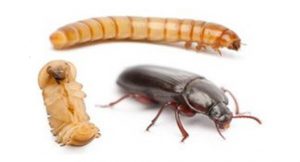Alexandre Goerlinger PhD thesis
 Microbial persistence and evolution of maternal transfer of immunity in an insect
Microbial persistence and evolution of maternal transfer of immunity in an insect
Started in october 2021
Funding: doctoral grant
Supervisor: Yannick Moret ; cosupervisor: Thierry Rigaud
Abstract
Trans-generational immune priming (TGIP) corresponds to a plastic increase in the immunocompetence of the offspring following exposure of the mother to a pathogen. An important issue to address about the ecology and evolution of TGIP is whether it is adaptive. If TGIP is adaptive, it may have evolved in response to selection pressures imposed by pathogenic microbiota that can infect their hosts over several generations. Several ecological conditions have been proposed as being necessary for the evolution of TGIP, including the probability of repeated infection between the parents’ generation and the offspring’s. However, this hypothesis has never been formally tested. Since not all pathogens are equally likely to persist in the environment of their host’s progeny, it is possible that TGIP has evolved only in response to the pathogens that are most likely to persist in the environment. This suggests that the induction of TGIP would vary according to the pathogenic microbes that have stimulated the individuals of the parent’s generation. Furthermore, while TGIP is beneficial, given that it provides better protection to the offspring, it also imposes costs on the offspring. A reduction of these costs should therefore be observed in parallel with the evolution of TGIP. In this context, this project aims to test the adaptive nature of TGIP in the mealworm, Tenebrio molitor, in which this phenomenon has been best described so far. To do so, we will estimate the persistence of different pathogenic microbes of T. molitor in its environment, and we will study the effect of maternal stimulation with these microbes on the immunity and the life history of the offspring (growth, longevity, fertility, etc.). The selective advantage of such a maternal effect will be tested in a relevant ecological context where the performance of the offspring will be analysed in environments that are either similar or different from those of the parents. The results of this study will establish unprecedented advances in the knowledge of the ecology and evolution of TGIP in an invertebrate model, in a natural and co-evolved ecological context.
Key words
ecoimmunology, entomopathogens, host-parasite interactions, innate immunity, Tenebrio molitor, transgenerational immune priming
Composition of the thesis advisory panel
Romain Pigeault, EBI, UMR 7267, université de Poitiers
Lionel Ranjard, UMR Agroécologie, INRAE Dijon
- extrait:
- lien_externe:
- titre:
- Persistance microbienne et évolution du transfert maternel d’immunité chez un insecte
- date_de_debut_these:
- octobre 2021
- nom:
- Goerlinger
- date_de_debut_these_numerique:
- 202110
- kc_data:
- a:8:{i:0;s:0:"";s:4:"mode";s:0:"";s:3:"css";s:0:"";s:9:"max_width";s:0:"";s:7:"classes";s:0:"";s:9:"thumbnail";s:0:"";s:9:"collapsed";s:0:"";s:9:"optimized";s:0:"";}
- kc_raw_content:
 Microbial persistence and evolution of maternal transfer of immunity in an insect
Microbial persistence and evolution of maternal transfer of immunity in an insectStarted in october 2021
Funding: doctoral grant
Supervisor: Yannick Moret ; cosupervisor: Thierry Rigaud
Abstract
Trans-generational immune priming (TGIP) corresponds to a plastic increase in the immunocompetence of the offspring following exposure of the mother to a pathogen. An important issue to address about the ecology and evolution of TGIP is whether it is adaptive. If TGIP is adaptive, it may have evolved in response to selection pressures imposed by pathogenic microbiota that can infect their hosts over several generations. Several ecological conditions have been proposed as being necessary for the evolution of TGIP, including the probability of repeated infection between the parents' generation and the offspring's. However, this hypothesis has never been formally tested. Since not all pathogens are equally likely to persist in the environment of their host's progeny, it is possible that TGIP has evolved only in response to the pathogens that are most likely to persist in the environment. This suggests that the induction of TGIP would vary according to the pathogenic microbes that have stimulated the individuals of the parent's generation. Furthermore, while TGIP is beneficial, given that it provides better protection to the offspring, it also imposes costs on the offspring. A reduction of these costs should therefore be observed in parallel with the evolution of TGIP. In this context, this project aims to test the adaptive nature of TGIP in the mealworm, Tenebrio molitor, in which this phenomenon has been best described so far. To do so, we will estimate the persistence of different pathogenic microbes of T. molitor in its environment, and we will study the effect of maternal stimulation with these microbes on the immunity and the life history of the offspring (growth, longevity, fertility, etc.). The selective advantage of such a maternal effect will be tested in a relevant ecological context where the performance of the offspring will be analysed in environments that are either similar or different from those of the parents. The results of this study will establish unprecedented advances in the knowledge of the ecology and evolution of TGIP in an invertebrate model, in a natural and co-evolved ecological context.
Key words
ecoimmunology, entomopathogens, host-parasite interactions, innate immunity, Tenebrio molitor, transgenerational immune priming
Composition of the thesis advisory panel
Romain Pigeault, EBI, UMR 7267, université de Poitiers
Lionel Ranjard, UMR Agroécologie, INRAE Dijon
